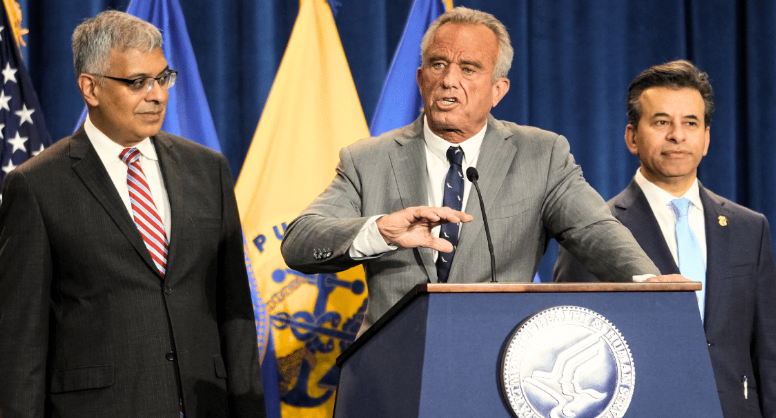
RFK Jr. Announces Ban On Artificial Food Dyes Nationwide
U.S. Ban On Artificial Coloring To Target Childhood Chronic Disease
“If we’re being honest, ADHD is not a genetic problem, and our obesity epidemic is not a willpower problem — it’s something that adults have done to children,” Dr. Marty Makary, commissioner of the U.S. Food and Drug Administration (FDA), said at a press conference on Tuesday, April 22.
This press conference saw the FDA respond to instruction from Health and Human Services Secretary Robert F. Kennedy Jr., who ordered the department to “examine concerning ingredients in the nation’s food supply.”
Speaking to the audience — which included many mothers holding signs with slogans like “MAHA Moms” and “Make America Healthy” — Makary announced, “Today, we are delivering on that promise.”
“Today, the FDA is taking action to remove petroleum-based food dyes from the U.S. food supply and from medications … For the last 50 years, American children have increasingly been living in a toxic soup of synthetic chemicals.”
Attention deficit hyperactivity disorder (ADHD), obesity, diabetes, insulin resistance, cancer, gastrointestinal issues, and allergic reactions have all been cited as potential side effects of these artificial additives.
In America, petroleum-based food dyes are found in products like Lucky Charms and Skittles.
“So why are we taking a gamble?” Makary asked. “As I know from my experience taking care of children as a doctor, you have to always listen to the mom.”
Speaking on the Make America Healthy Again movement, which took on its name following then presidential hopeful RFK Jr.’s endorsement of President Donald Trump in 2024, Makary said, “Republican, Democrat, and Independent moms showed up in high numbers to vote for President Trump on this very issue that Secretary Kennedy has championed.”
Ultra-processed foods may look more attractive, due to saturated colors, but Makary said they have resulted in 41% of American children having “at least one health condition,” and one in five being on medication.
“America’s children are sick,” Makary said. “There’s no one ingredient that accounts for the child chronic disease epidemic, and, let’s be honest, taking petroleum-based food dyes out of the food supply is not a silver bullet that will instantly make America’s children healthy.”
However, Makary said the removal of petroleum-based food dyes is “one important step” to a healthier future.
“Cancer and diabetes in young people is going up at an alarming rate and nobody seems to know why,” Makary said. “We have to turn our attention to underlying causes, such as chemicals and toxins that children are exposed to, not just more insulin and chemotherapy.”
Action Being Taken By The FDA
30 states have introduced laws “with a patchwork of standards for food companies,” so the food industry, in an effort to comply, has asked for guidance, Makary said.
The FDA is taking the following action to meet this need:
Establishing a national standard and timeline for the food industry to transition from petroleum-based food dyes to natural alternatives;
Initiating a process to revoke authorization of synthetic food colorings, including those not in production (namely Citrus Red 2 and Orange B) in the coming weeks; and
Taking steps to eliminate the remaining six synthetic dyes on the market from the U.S. food supply (specifically Red No. 40, Yellow No. 5, Yellow No. 6, Blue No. 1, Blue No. 2, and Green No. 3) by the end of 2026.
The FDA is also requesting food companies remove Red No. 3 sooner than the previously established deadline of 2027-2028, which was set on January 15 under the Biden administration.
“These steps that we are taking means that the FDA is effectively removing all petroleum-based food dyes from the U.S. food supply,” Makary said to applause. “For companies that are currently using petroleum-based red dye, try watermelon juice or beat juice. For companies currently combining petroleum-based yellow chemical and red dyes together, try carrot juice.”
In the coming weeks, the FDA will introduce four new natural color additives, and will also begin reviewing applications for others.
Thanking America’s food manufacturers, Makary said:
“Many have been extremely cooperative. There are many good people in food manufacturing, delivering on the needs of the American public, and they have done exactly what we have asked them to do … A hundred years ago, we asked them to focus on mass food production to solve food insecurity. Now, given our child chronic disease epidemic, and enormous suffering and cost that has ensued, we have to come together to address the new problem.“
RFK Jr. Speaks
Coming only a matter of days after his HHS press conference regarding the CDC’s report on increasing autism prevalence in America’s youth, the banning of petroleum-based food dyes checks off another of RFK Jr.’s key areas of concern.
“When my uncle [John F. Kennedy] was president, 3% of American kids had chronic disease,” RFK Jr. stated. “Today, it’s around 60%.”
RFK Jr. also noted that 74% of American children cannot qualify for service in the Armed Forces.
“I want to commend food companies for working with us,” RFK Jr. said. “We’re going to get rid of the dyes, and, one by one, we’re going to get rid of every ingredient and additive in food that we can legally address.”
However, RFK Jr. said there is one ingredient the government will never be able to remove: sugar.
He added, “Sugar is poison, and Americans need to know that.”
Finding a way to educate the American public on sugar is one of his objectives in the months and years ahead, but he said that is just one aspect of the issue.
“The problem is [that the food and pharmaceutical] industry is making money on keeping us sick,” RFK Jr. said, adding that news organizations are not talking about this. “One of the possible reasons for that is the amount of money that is coming from the pharmaceutical companies into our media and from these food companies. The advertising at least plays a factor — that incredible revenue stream — in disabling their capacity or inclination for skepticism or critical thinking.”
When asked if there would be a way for Americans to know which products are complying with the phasing out of petroleum-based additives, RFK Jr. responded, “We’re looking at labeling. Labeling, we’d have to go to Congress for.“
Labeling, he said, is a departmental priority, but he hopes to have a way for consumers to know what they’re purchasing and putting into their bodies even before the labeling can be approved.
“One of the things that [HHS] is going to do is we’re going to post all the information we have about every additive on an open source website, and we’re going to encourage companies which develop apps … so that mothers can go in and scan a barcode on any product in their grocery store and know what’s in it and what’s not.”
Another question posed to RFK Jr. concerned his prioritization of action and research into the cause of autism and the removal of petroleum-based food dyes.
“By 2035, it’s going to cost us — autism alone, or just one of these chronic diseases — will cost our country $1 trillion a year,” he replied. “We have to end that, and we have to end that because the children and their families are suffering so terribly.”
Watch the full April 22 press conference here:

![Inside Kelly Clarkson’s Final Act of Grace for Ex-Husband Brandon Blackstock [Report]](https://countrylivingnation.com/wp-content/uploads/2026/01/kelly-1-660x470.png)

